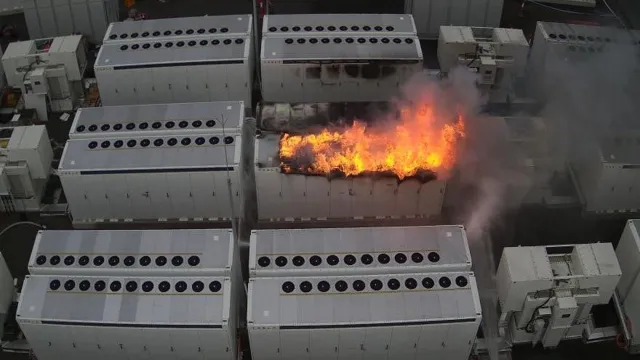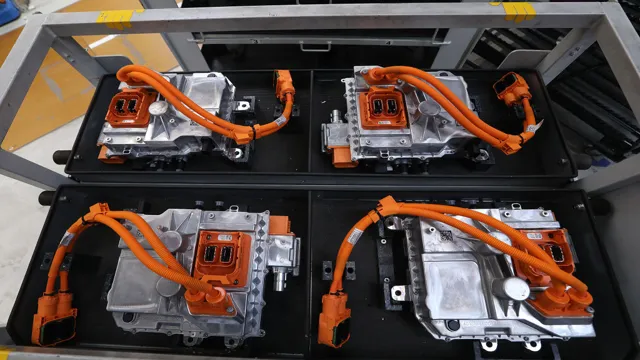Unveiling the Shocking Truth: The Troubling Trend of Electric Car Batteries Burning
Electric cars are gaining in popularity due to their zero emissions and environmental friendliness. However, there have been cases of electric car batteries catching fire, causing concern among consumers. This issue raises important questions, such as what causes electric car battery burning and how can it be prevented? Electric car battery burning can occur due to several reasons, including exposure to heat, physical damage to the battery, and manufacturing defects.
The lithium-ion batteries in the cars are highly flammable and produce a large amount of heat in case of a fire. To prevent battery burning, it is essential to maintain the battery’s condition and ensure that it is not exposed to extreme temperatures or external trauma. Regular maintenance and inspection are necessary to identify any potential issues before they become severe.
Additionally, manufacturers are continuously working to improve battery technology, making them safer and more reliable. Ultimately, it is crucial to understand that electric car battery burning is a rare occurrence, and the benefits of electric cars far outweigh the risks. By taking preventative measures and keeping the battery in good condition, we can continue to enjoy the many environmental and economic benefits of electric cars with peace of mind.
What Causes Electric Car Batteries to Burn?
Electric car batteries burning may occur due to a variety of reasons. One factor could be a malfunction in the design or construction of the battery itself, leading to an internal short circuit or other electrical fault. Overcharging or charging at a high temperature can also cause the battery to overheat and eventually catch fire.
Poor maintenance of the battery, such as leaving it in a discharged state for extended periods, can also damage the battery and lead to combustion. In rare cases, collisions or punctures may damage the battery, causing it to ignite. It is vital to note, however, that electric vehicle battery fires are incredibly infrequent, and electric cars have an excellent safety record.
Additionally, many safety measures, including cooling systems, fusible plugs, and physical barriers, are implemented in electric car batteries to minimize the risk of combustion.
Overcharging and Overheating
Electric car batteries are the powerhouse of electric vehicles and are responsible for the car’s overall performance. However, overcharging and overheating can cause these batteries to burn, leading to a dangerous and potentially fatal situation. Overcharging occurs when an electric car battery is continually charged beyond its capacity, causing the battery’s electrolytes to heat up, expand, and eventually burst.
This can lead to explosions and serious injury or death. Overheating, on the other hand, occurs when the battery is exposed to high temperatures for an extended period, causing it to degrade and lose its capacity over time. This leads to a shorter battery life and a decrease in the car’s overall performance.
It is crucial to ensure that electric car batteries are charged and maintained correctly to prevent overcharging and overheating, ensuring the maximum life of the battery and the safety of the car’s occupants.

Internal Short Circuits
Internal short circuits are the primary cause of electric car battery fires. These short circuits happen when the positive and negative parts of the battery come into physical contact. This contact can happen when the separator that keeps the opposing terminals separated gets punctured, or there’s a manufacturing defect in the cells.
When short circuits happen, a tremendous amount of energy gets released quickly, causing the battery to overheat and catch fire. This event can also happen during a crash or collision, which punctures or breaks the battery casing, leading to an internal short circuit and a significant risk of fire. In conclusion, electric car batteries may burn due to internal short circuits, which occurs when there is a breach in the separator, poor manufacturing, or as a result of an accident.
Real Life Examples of Electric Car Battery Fires
Electric car battery burning has been a topic of concern for many drivers and potential buyers of electric vehicles. While these events are rare, there have been some real-life examples of electric car battery fires. In 2018, a Tesla Model S caught fire twice in Florida after being involved in an accident, causing the car to burn for several hours.
Another incident occurred in Austria in 2020 when a Porsche Taycan caught fire while parked in a garage. Fortunately, no one was injured in either of these incidents. Although these accidents are rare, they highlight the importance of proper maintenance and handling of electric car batteries.
In most cases, they are caused by external factors such as collisions or damage to the battery. Manufacturers are continuously improving battery technology and safety measures to reduce the risk of these events occurring in the future.
Tesla Model S Fire in Shanghai
Electric Car Battery Fires Electric cars have become increasingly popular due to their eco-friendliness, impressive features, and easy maintenance. However, concerns over the safety of their batteries have arisen after a few incidents of battery fires. One of the most recent incidents occurred in Shanghai, where a Tesla Model S caught fire.
The incident was captured on a video that soon went viral on social media. While electric car battery fires are relatively rare, they can happen due to various reasons such as overheating, short circuits, manufacturing defects, or even crashes. The good news is that electric car manufacturers are taking notice and working towards developing safer batteries with better insulation, monitoring systems, and fire suppression technology.
Electric car owners can also take precautions such as avoiding extreme temperatures, monitoring their battery health regularly, and following manufacturer guidelines for charging, storage, and maintenance. In conclusion, while battery fires in electric cars can be alarming, the risk can be minimized with proper precautions and advancements in technology.
Chevrolet Bolt Recall for Battery Fire Risk
Electric car battery fires
However, it’s important to note that these incidents are rare and electric car owners should still feel confident in their vehicle’s safety measures. Manufacturers are continually improving battery technology and implementing safety features to prevent such incidents. It’s also crucial for electric car owners to follow proper charging and maintenance procedures to minimize the risk of a battery fire.
So, while there are examples of electric car battery fires, they are not a common occurrence and should not deter potential buyers from considering this eco-friendly and efficient mode of transportation.
Preventing Electric Car Battery Fires
Electric car battery fires have become a growing concern for drivers and manufacturers alike. While electric vehicles are a greener alternative to traditional gas-powered cars, they pose unique risks when it comes to their lithium-ion batteries. These batteries are highly flammable and can ignite if damaged, overcharged, or exposed to extreme temperatures.
To prevent battery burning, manufacturers are implementing safety measures such as thermal management systems, reinforced battery enclosures, and stronger chemical separators. In addition, drivers are advised to avoid fast charging their electric cars too often, as well as to park them in well-ventilated areas to avoid heat buildup. Overall, preventing electric car battery fires requires a combination of proactive measures on both the manufacturer and driver sides to ensure safe and sustainable mobility.
Regular Maintenance
Regular maintenance is vital to prevent electric car battery fires. As with any vehicle, electric cars require periodic maintenance to ensure that they operate safely. Ensuring that battery cells are well-maintained is crucial in preventing battery fires.
Regular checks of the battery’s coolant and voltage levels, as well as cleaning of the battery compartment, can prevent the buildup of flammable materials that can ignite if exposed to high temperatures. Proper charging practices can also prevent fires. Overcharging or overheating lithium-ion batteries can cause thermal runaway, leading to battery fires.
Regular maintenance can detect potential issues before they become problems, thereby preventing fires from occurring. By staying vigilant and taking good care of their electric vehicle’s battery, drivers can help prevent dangerous fires and ensure a safer driving experience for themselves and others on the road.
Proper Charging Practices
One of the most crucial aspects of electric car ownership is proper charging practices. Not only does it prevent your battery from deteriorating prematurely, but it also helps to prevent battery fires. Charging your electric car correctly entails using the recommended charging equipment, avoiding overcharging, and avoiding charging when the ambient temperature is too high.
Overcharging can cause the battery to become too hot, which can lead to a fire. Similarly, charging in hot ambient temperatures can heat up the batteries and increase the risk of a fire. It’s important to note that while electric car battery fires are rare, following proper charging practices is crucial to minimizing the risk of such an event.
By taking proper steps to charge your electric car, you can keep your battery in good condition while ensuring safe and reliable operation.
Avoiding Physical Damage
As electric cars become more widespread, it’s important to know how to prevent battery fires. One of the most crucial steps in avoiding physical damage is to ensure that the battery isn’t exposed to extreme temperatures. If the battery gets too hot, it can become damaged and potentially catch fire.
Additionally, it’s important to make sure that the battery isn’t punctured or damaged in any other way, as this can lead to leaks and dangerous situations. It’s also essential to use the correct charging equipment and follow the manufacturer’s guidelines to avoid overcharging the battery. By taking these precautions, we can enjoy the benefits of electric cars without putting ourselves or others at risk.
Remember to handle the battery with care and make sure you know how to identify any warning signs of potential damage.
Conclusion: Safety First for Electric Car Owners
In conclusion, we can say that watching an electric car battery burn is like witnessing a fiery love affair between technology and nature. While the impressive power and innovation of electric cars showcase our ability to harness renewable energy, their occasional combustion is a harsh reminder that technology, like love, can sometimes be unpredictable and uncontrollable. So, just like in any relationship, it’s important to handle this potential danger with caution and care – because when sparks fly, they can go from a hot romance to a fiery disaster in the blink of an eye.
FAQs
What causes electric car batteries to catch fire?
Electric car batteries can catch fire due to thermal runaway, a chain reaction within the battery cells that leads to overheating and ultimately a fire.
What safety measures are in place to prevent electric car battery fires?
Electric car manufacturers have implemented safety measures such as liquid cooling, fire-resistant materials, and battery management systems to prevent battery fires.
Can the risk of electric car battery fires be reduced by proper maintenance?
Yes, regular maintenance and inspections can identify potential issues with the battery or electrical components, reducing the risk of a battery fire.
How should one respond in the event of an electric car battery fire?
In the event of an electric car battery fire, it is important to evacuate the area and contact emergency services. Attempting to extinguish the fire yourself could be dangerous, as the battery may continue to react even after the fire appears to be out.





